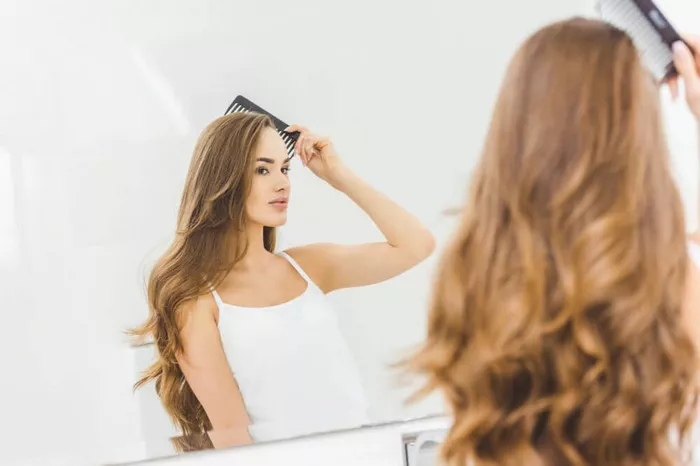Thick hair is a trait many people admire, but if you have it, you might wonder: Why is my hair so thick? The answer isn’t simple. Hair thickness depends on genetics, lifestyle, health, and even your environment. This article breaks down the reasons your hair might be thick, how to care for it, and why it’s unique. Let’s dive in!
Genetics: The Biggest Factor in Thick Hair
Your genes play the largest role in determining hair thickness. Here’s how:
Hair Follicle Size and Density
- Follicle size: Each hair strand grows from a follicle (a tiny pocket in your scalp). If your follicles are large, they produce thicker strands.
- Follicle density: This refers to how many follicles you have per square inch of scalp. More follicles = more hair.
- Inherited traits: If your parents or grandparents have thick hair, you likely inherited the genes for large or dense follicles.
Ethnicity and Hair Type
Studies show hair thickness varies by ethnicity. For example:
- Asian hair tends to have the thickest strands.
- Caucasian hair is often finer but may have higher density.
- African hair has a coiled texture, which can create the appearance of volume.
Hormones: The Hidden Influencers
Hormones like testosterone, estrogen, and thyroid hormones affect hair growth and thickness.
Androgens (Testosterone)
High testosterone levels can increase hair follicle size, leading to thicker strands. This is why men often have thicker hair than women.
DHT (Dihydrotestosterone): A byproduct of testosterone, DHT binds to hair follicles and can either boost thickness (in body hair) or cause thinning (in scalp hair, depending on genetics).
Thyroid Hormones
- An overactive or underactive thyroid gland disrupts hair growth cycles. Balanced thyroid hormones support healthy, thick hair.
Pregnancy and Menopause
- During pregnancy, estrogen levels rise, prolonging the hair growth phase and reducing shedding. This can make hair feel thicker temporarily.
- After menopause, estrogen drops, which may thin hair over time.
Hair Care Habits: How You Treat Your Hair
Your daily routine impacts hair health and thickness.
Gentle Washing
Overwashing strips natural oils, weakening hair. Use sulfate-free shampoos 2-3 times weekly to maintain moisture.
Scalp massages: Stimulate blood flow to follicles, encouraging growth.
Heat and Chemical Damage
- Frequent blow-drying, straightening, or coloring weakens hair, making it brittle. Thick hair can handle more abuse, but damage still causes split ends and breakage.
Products for Thick Hair
- Look for lightweight moisturizers (like argan oil) to avoid weighing hair down.
- Avoid heavy waxes or gels, which make thick hair look greasy.
Diet and Nutrition: Fuel for Healthy Hair
What you eat directly affects hair health. Key nutrients include:
Protein
- Hair is made of keratin, a protein. Eat eggs, fish, beans, or tofu to support growth.
Vitamins
- Biotin (Vitamin B7): Strengthens hair. Found in nuts, eggs, and sweet potatoes.
- Vitamin D: Low levels are linked to hair loss. Get sunlight or eat fatty fish.
- Iron: Carries oxygen to follicles. Spinach, lentils, and red meat are great sources.
Hydration
- Dehydration makes hair dry and prone to breakage. Drink 8 glasses of water daily.
Age and Hair Thickness
Hair changes over time:
- Childhood: Hair is often fine but dense.
- Puberty: Hormonal shifts may increase thickness.
- Adulthood: Hair strands thicken until your 40s, then gradually thin due to hormonal changes.
Medical Conditions and Medications
Some health issues or drugs affect hair thickness:
Conditions That Boost Thickness
- PCOS (Polycystic Ovary Syndrome): High androgen levels can cause thicker hair on the scalp (but also excess body hair).
- Hyperthyroidism: An overactive thyroid may speed up hair growth.
Medications
- Minoxidil: A topical treatment that stimulates hair growth.
- Steroids: Can cause hair thickening as a side effect.
Environmental Factors
Your surroundings play a role:
Climate
- Humid climates make hair absorb moisture, creating frizz and volume.
- Cold, dry weather can dehydrate hair, making it brittle.
Pollution
- Pollutants clog follicles, but thick hair may be less prone to damage than fine hair.
Myths About Thick Hair
Let’s bust common misconceptions:
- Myth: “Brushing 100 times a day makes hair thicker.”
Truth: Overbrushing causes breakage. - Myth: “Shaving makes hair grow back thicker.”
Truth: Shaving blunts the tip, creating a coarse feel, but doesn’t change thickness.
How to Manage Thick Hair
Thick hair can be challenging. Try these tips:
- Layers: Ask your stylist for layers to reduce bulk.
- Deep conditioning: Use masks weekly to prevent dryness.
- Wide-tooth combs: Detangle gently to avoid breakage.
When to See a Professional
If your hair suddenly becomes thicker (or thinner), consult a doctor. Sudden changes could signal hormonal imbalances or health issues.
Conclusion
Thick hair is a gift influenced by your DNA, health, and habits. With proper care, it can look healthy and vibrant. Celebrate your unique texture—it’s part of what makes you you!
Related topics:
Top 11 Hair Growth Vitamins for Longer, Thicker Hair
How Can I Grow My Hair Longer and Thicker?
When Does Hair Thicken After a Transplant?


